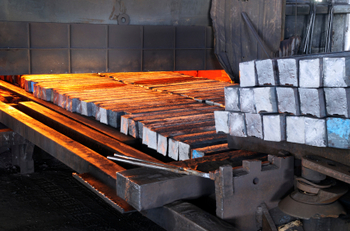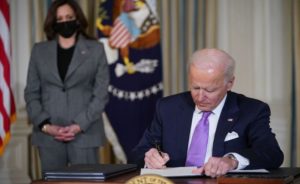
Trade body says China’s restrictions violate international agreements.
The U.S. steel industry won a decisive victory against Chinese trade controls earlier this month when an appeals panel of the World Trade Organization (WTO) found that China had violated trade rules by placing restrictions on the importation of certain forms of steel from the United States.
In 2010, Chinese officials imposed restraints on the importation of U.S.-manufactured “grain-oriented electrical steel” — or GOES, for short. A Chinese government investigation uncovered what the Chinese considered to be U.S. violations of international trade rules under the General Agreement of Tariffs and Trade (GATT), the international agreement that sets standards for trade in goods.
Specifically, the Chinese government accused the United States of offering improper subsidies to its steel industry via a series of federal and state procurement laws that give domestic companies priority on government contracts.
China also accused the United States of an improper trade practice known as “dumping,” which entails the export of goods at artificially low prices. Dumping undercuts the price at which a country’s domestic industry can sell a product, eventually forcing foreign companies out of the market. The Chinese argued that American GOES manufacturers were exporting their products to China at far lower prices than would be appropriate under normal circumstances.
In response to the alleged violations, the Chinese imposed countervailing duties, using tariffs to inflate the price of U.S. GOES in China. The United States challenged the duties at the WTO, claiming China had misapplied international law and failed to investigate properly the activities of U.S. steel companies.
According to the complaint, Chinese investigators made inaccurate assumptions about the nature of U.S. procurement laws. The U.S. also accused the investigation of withholding evidence and failing to support adequately its conclusions. For example, the complaint alleged that the Chinese investigation determined that U.S. manufacturers exported steel at rates between 10% and 25% below the fair market price, but “did not disclose the information forming the basis for the calculation” of those rates.
The initial WTO panel that heard the U.S. complaint found that China violated trade agreements by instituting reactive measures against U.S. steel without rendering sufficient support for its claims. In its recent decision, the WTO appellate body upheld the findings of the initial panel. The appellate body rejected China’s appeal, explaining that the country’s findings on the price effects of imports fell short of criteria set out in the Anti-Dumping Agreement and the Agreement on Subsidies and Countervailing Measures.
The appellate panel reasoned that Chinese officials operated under an incorrect interpretation of the relevant trade agreements. China presumed, for example, that the investigation into possible dumping “merely require[d] an investigating authority to consider the existence of price depression or suppression, and [did] not require the consideration of any link between subject imports and these price effects.” In fact, the panel said that trade standards require investigators “to consider the relationship between subject imports and the prices of the like domestic products so as to understand whether the volumes and/or prices of the subject imports explain the occurrence of significant depression or suppression of domestic imports.”
The WTO’s appellate decision bars China from imposing trade restrictions on GOES imported from the United States. The ruling comes as a considerable relief to U.S. manufacturers, as exports of GOES to China fell from $270 million in 2008 to less than $3 million in 2011.
In its press release, the Office of the United States Trade Representative (USTR) explained that the United States filed its complaint “ to ensure that China does not harm U.S. exports . . . by abusing trade remedy practices.” U.S. Trade Representative Ron Kirk characterized the WTO decision as “a victory for the United States as well as for American workers and manufacturers.”
In its statement on the decision, the Chinese Ministry of Commerce said that it will “carefully evaluate” the WTO report “and will properly deal with the case according to WTO rules.” The ministry also noted that the appellate body did not dispute a number of Chinese positions, including that its internal investigation did not “need to prove a causal link between price effects and the dumping and subsidy in its price effects analysis.”
Conclusion of the GOES controversy does not mean an end to trade conflicts between the United States and China. WTO records separately show 23 different claims between the two countries—15 filed by the U.S and eight filed by China— working their way through dispute resolution. WTO claims by the U.S. against China have increased in recent years, and are expected to continue in light of President Obama’s February, 2012, executive order creating a trade enforcement unit within the USTR. Republican presidential candidate Mitt Romney similarly supports trade remedies against China, specifically advocating during the second Presidential debate an increase in unilateral tariffs on Chinese goods.
According to a recent report from the non-partisan Congressional Research Service, many policymakers support stronger measures against perceived Chinese trade violations. Others worry that such actions will bring retaliation and that trade tensions should be solved through bilateral agreements rather than adversarial proceedings at the WTO.



